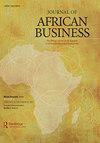Does Chinese Foreign Direct Investment Improve the Welfare of Africans?
IF 1.8
Q3 BUSINESS
引用次数: 11
Abstract
ABSTRACT This paper assesses the impact of Chinese foreign direct investment (FDI) on welfare in African economies using recently available data on Chinese FDI in 52 African countries between 2003 and 2018. Using fixed effects and instrumental variable (IV) estimations, we find that Chinese FDI contributes significantly to the improvement of welfare in African countries. This positive impact also holds for the sub-sample of Sub-Saharan African (SSA) countries. The results are robust across the fixed effects and IV estimations when variables that affect welfare are controlled for. The findings suggest that China’s claim of a “win-win” aim for its rising investment in African countries may hold.中国对外直接投资是否改善了非洲人民的福利?
本文利用2003年至2018年中国在52个非洲国家的直接投资数据,评估了中国对外直接投资(FDI)对非洲经济体福利的影响。利用固定效应和工具变量(IV)估计,我们发现中国的FDI对非洲国家福利的改善有显著的贡献。这种积极影响也适用于撒哈拉以南非洲(SSA)国家的子样本。当控制影响福利的变量时,结果在固定效应和IV估计中是稳健的。研究结果表明,中国在非洲国家不断增加投资的“双赢”目标可能是成立的。
本文章由计算机程序翻译,如有差异,请以英文原文为准。
求助全文
约1分钟内获得全文
求助全文
来源期刊

Journal of African Business
BUSINESS-
CiteScore
4.60
自引率
10.50%
发文量
36
期刊介绍:
Journal of African Business is the official journal of the Academy of African Business and Development, the largest network of professionals committed to advancement of business development in African nations. JAB strives to comprehensively cover all business disciplines by publishing high quality analytical, conceptual, and empirical articles that demonstrate a substantial contribution to the broad domain of African business. Regardless of the research context, tradition, approach, or philosophy, manuscripts submitted to JAB must demonstrate that the topics investigated are important to the understanding of business practices and the advancement of business knowledge in or with Africa. Particularly, JAB welcomes qualitative and quantitative research papers. JAB is not, however, limited to African-based empirical studies. It searches for various contributions, including those based on countries outside Africa that address issues relevant to African business. Targeted toward academics, policymakers, consultants, and executives, JAB features the latest theoretical developments and cutting-edge research that challenge established beliefs and paradigms and offer alternative ways to cope with the endless change in the business world. Covered areas: Accounting; Agribusiness Management and Policy; Business Law; Economics and Development Policy; Entrepreneurship and Family Business; Finance; Global Business; Human Resource Management; Information and Communications Technology (ICT); Labor Relations; Marketing; Management Information Systems (MIS); Non-Profit Management; Operations and Supply Chain Management; Organizational Behavior and Theory; Organizational Development; Service Management; Small Business Management; Social Responsibility and Ethics; Strategic Management Policy; Technology and Innovation Management; Tourism and Hospitality Management; Transportation and Logistics
 求助内容:
求助内容: 应助结果提醒方式:
应助结果提醒方式:


